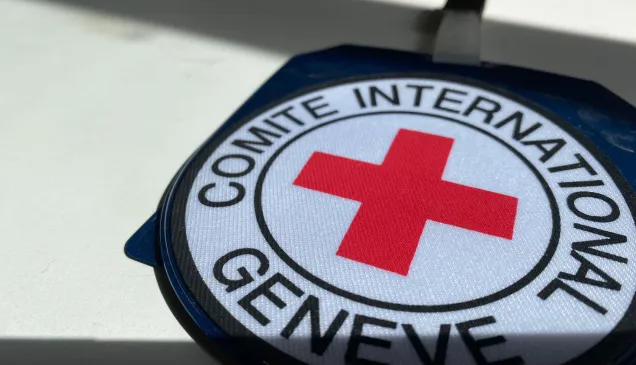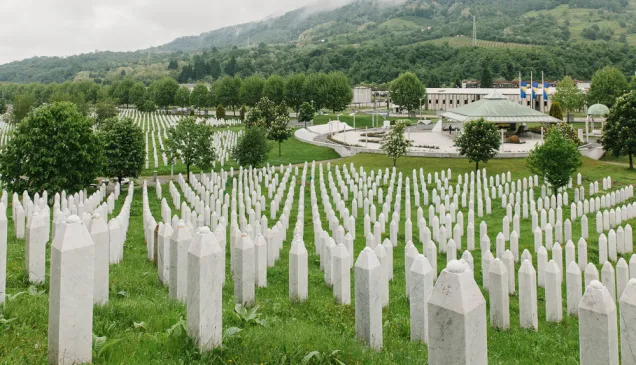Bosnia-Herzegovina: 25 years after the end of the conflict COVID-19 brings additional uncertainty for the families of the missing
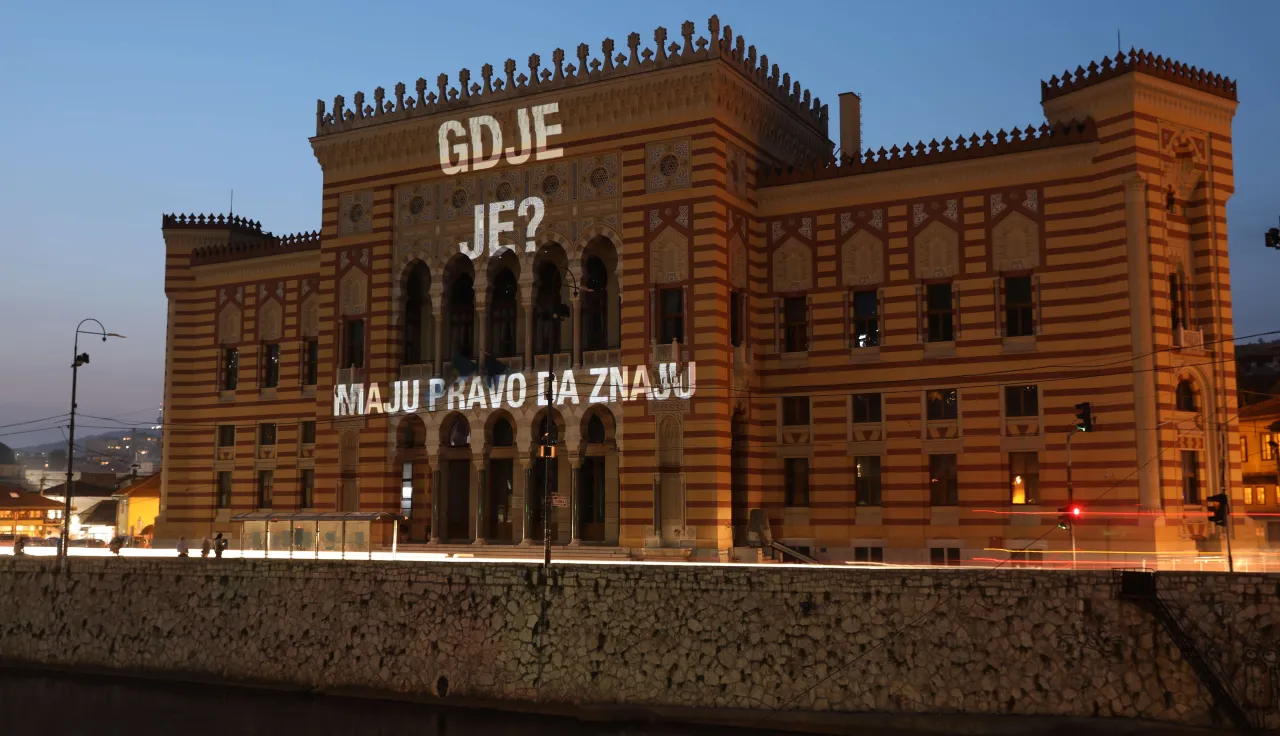
In 2020, Bosnia-Herzegovina marked the 25th anniversary of the Dayton Peace Agreement and the end of the 1992-1995 conflict, which left the country with devastating consequences. Over 100,000 people have died and tens of thousands went missing as a result of the war. Over 7,000 of them are still unaccounted for.
Bosnia-Herzegovina has been harshly affected by the COVID-19 pandemic. The country was in a strict lockdown for several months, and later on, the society had to adapt to the mid and long-term consequences of the pandemic. This also meant that the work of the Missing Persons Institute (MPI) and its efforts to find missing people were temporarily suspended in the first half of the year. Still, 70 persons were exhumed and 52 persons identified in 2020, according to official MPI statistics.
The ICRC in Bosnia-Herzegovina throughout the year continued to support the families of missing people and other actors involved in the process of searching for them, taking into account their specific needs during the ongoing pandemic.
The baseline for ICRC's action remains its five-year strategy on missing persons in the Western Balkans, which foresees exploration of all feasible avenues to clarify the fate and whereabouts of as many missing persons as possible to finally bring closure to their families and communities in the country.
Work with family associations during COVID-19 and beyond
Members of family associations, like all citizens of Bosnia and Herzegovina, were somehow lost, faced with something new, unknown and frightening. And the unknown and uncertain are following families of the missing for more than 25 years.
At the same time, the pandemic interrupted and stopped the entire searching process, and surely that had an immense impact on those families who are still searching for their missing relatives.
This quote well describes what families of the missing have experienced in 2020. More than a quarter-century of uncertainty, combined with the fear from the COVID-19 virus put the families in an unenviable position.
The ICRC supports family associations of the missing persons in the implementation of activities in their local communities. In 2020, the ICRC provided financial support for 11 psychosocial support projects of family associations. Each year, up to 5,000 relatives of missing persons directly benefit from such projects.
As a part of initiatives to explore innovative ways to help the families and find missing people, the ICRC in 2020 granted scholarships for three postgraduate and two interdisciplinary research projects on the topics relevant for the tracing process, forensic, psychological, social and legal consequences of the missing person issue in Bosnia-Herzegovina.
Overall, 17 research projects have received financial and technical support from the ICRC in the past three years.
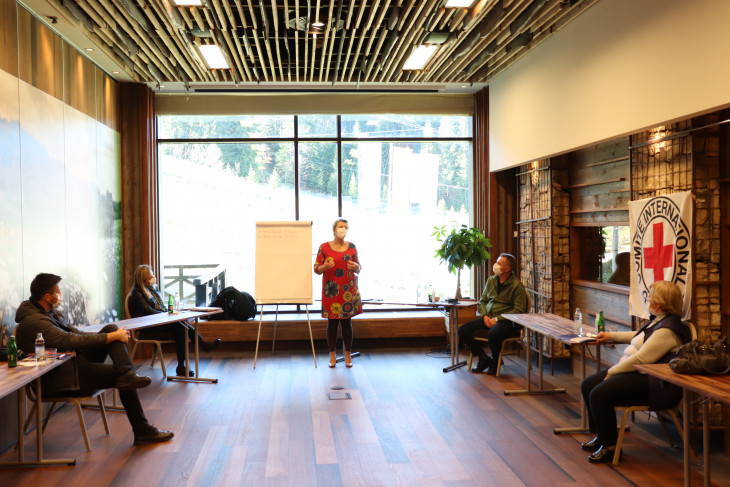
One of mental health and psychosocial support workshops for families of the missing, Jahorina, November 2020
Since more than 20 years, the ICRC has been regularly and closely working with around 40 family associations from across the country. To strengthen their capacities and empower them to effectively deal with the challenges that the pandemic brought, the ICRC organized a series of workshops related to mental health, participated by members of 31 family associations.
It was the fifth year since the ICRC has been organizing such kind of events for the families of the missing. Although each workshop represents a follow-up to a previous one, the COVID-19 pandemic was inevitably the central topic of this year's discussion, as a phenomenon that currently has a huge effect on families of the missing and their associations. The ICRC also organized similar workshops for 24 field investigators of the Missing Persons Institute.
Led by experienced psychologists and psychotherapies, through discussion in smaller groups, workshops aimed to explore how stress caused by the pandemic, combined with the stressful process of looking for the missing, affects the work of the field investigators and family associations of the missing persons.
The additional aim of the workshops was to establish multidisciplinary and systematic support for families of the missing in Bosnia-Herzegovina. Participants, upon the conclusion of the seminar, return to their communities where they share collected knowledge among other families and use it during the organization of activities in associations they are working.
Assistance to the families most affected by COVID-19
During the COVID-19 lockdown, the ICRC contacted more than 40 family associations of missing persons to check on their well-being. A total of 1,777 relatives of the missing, who are over 65 years old, have been identified from the ICRC's records as particularly vulnerable during the COVID-19 pandemic and its economic consequences.
With ICRC's support, Red Cross volunteers have directly contacted over 1,000 of them, of which 800 expressed the need for assistance (food or hygiene parcels and other Red Cross services). For those families, the ICRC provided packages with the items that have been reported as the most needed.
International Day of the Disappeared
"Families of the missing have right to know what happened to their loved ones" was the central message of the ICRC's 2020 public campaign to mark the International Day of the Disappeared on 30 August. The ICRC traditionally marks this day through different formats under the slogan "Gdje je?" (Where are they?) which has been widely accepted as a symbol for the missing person issue among interlocutors and in the public across the country.
In 2020 due to the ongoing pandemic, larger outdoor events and gatherings have not been organized, but the campaign focused on two elements in the spirit of the pandemic: an online campaign (Facebook and Twitter) and protective face masks labelled with "Gdje je?".
To remind the public and authorities on the needs and rights of the families, but also on the state's obligation to support them and provide the answers, the ICRC delegation in Sarajevo produced a short but effective video released on social networks. More than 90 participants participated in the video wearing the labelled face masks, including relatives of the missing, Red Cross volunteers, and messages of 12 key ambassadors and heads of international organizations in Bosnia-Herzegovina.
For the second part of the campaign, Red Cross branches and family associations organized smaller events in over 40 communities across the country, distributing thousands of face masks labelled with the slogan "Gdje je?" to the citizens. Citizens and interlocutors were invited to share their photos and videos wearing the labelled masks on social networks on 30 August, which they widely followed.
ICRC's search for information in international archives
The lack of credible information on the locations of the missing continues to pose one of the most significant obstacles towards the conclusion of one of the most painful chapters of Bosnian-Herzegovinian contemporary history.
Since July 2018, the ICRC contacted 42 countries, seven international/intergovernmental organizations (NATO, EU, UN, UNHCR, OSCE) and several other organizations, local and international NGOs, requesting transmission of information from their archives that could potentially lead to the clarification of the fate and whereabouts of persons missing related the conflicts in the region.
As a result, and for the time being, the USA, France, Denmark, Poland, Canada, Norway, Finland, and Italy sent relevant documentation to the ICRC, while the Netherlands, EU, NATO HQ, and the UNHCR have granted direct access to their respective archives to the ICRC team of researchers.
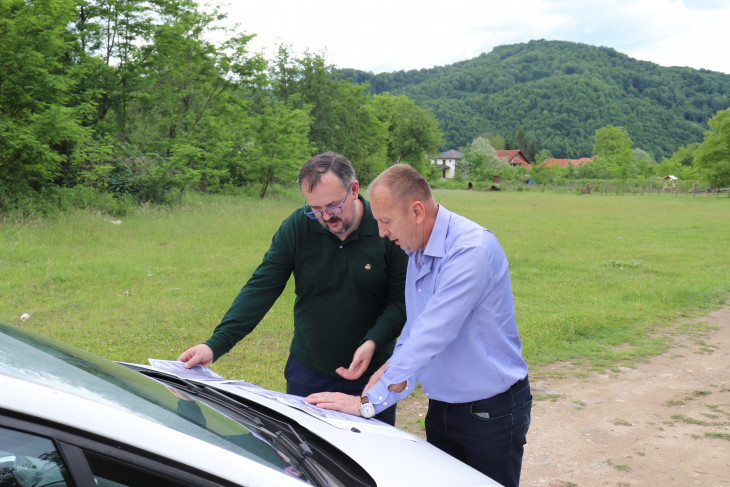
MPI investigator and ICRC researcher jointly assess the location of a potential gravesite
In October 2018, the ICRC signed an Agreement with the International Residual Mechanism for Criminal Tribunals (IRMCT) based in The Hague. The archives of this institution are the primary source of information pertaining to the conflicts in the Western Balkans with over 10 million pages of documents available.
By reinforcing previous cooperation, the ICRC aimed at searching these archives for information that can contribute to clarifying the fate and whereabouts of each missing person. Since September 2018, ICRC researchers in The Hague completed the search for relevant information related to over 3,700 missing persons.
Around 40,000 pages of relevant documents obtained mainly from the former tribunal in The Hague, but also military archives of states and international organization, were handed over to the Missing Persons Institute (MPI) for its further application in the field. To facilitate the processing and analysis of provided information, the ICRC in the past two years also handed over 27 analytical reports containing recommendations and selected information related to potential gravesites to the national authorities for their further action.
ICRC's experts regularly follow up the processing of transmitted data through field visits to the MPI local offices across Bosnia-Herzegovina, helping them to find micro-locations of potential gravesites and attending exhumations. According to a recent analysis, the ICRC handed over documentation related to around 70% of municipalities in which exhumations have taken place in the past three years.
Cooperation with the Missing Persons Institute and forensic institutions
To boost the capacities of the Missing Persons Institute to process the data received from the ICRC and use them in the field, the ICRC organized two seminars focusing on analytical methods and techniques in the process of searching for missing persons. More than 20 MPI field investigators participated in the training, which was also attended by representatives of Bosnia-Herzegovina's Prosecutor's Office and the IRMCT office in Sarajevo.
During the 4-day training, ICRC's and external experts presented to the MPI field investigators innovative methods to more easily identify and process relevant information that leads to the discovery of gravesites, focusing on documentation which the ICRC provides to the MPI from the international archives.
Besides strengthening the working capacities of the MPI staff, the ICRC aims to provide mental health and psychosocial support to them. In that matter, the ICRC organized a series of stress management workshops for 20 field investigators and field administrative staff of the MPI. The focus of those workshops was the influence of the COVID-19 pandemic on the work of MPI staff and their communication with the families of missing persons.
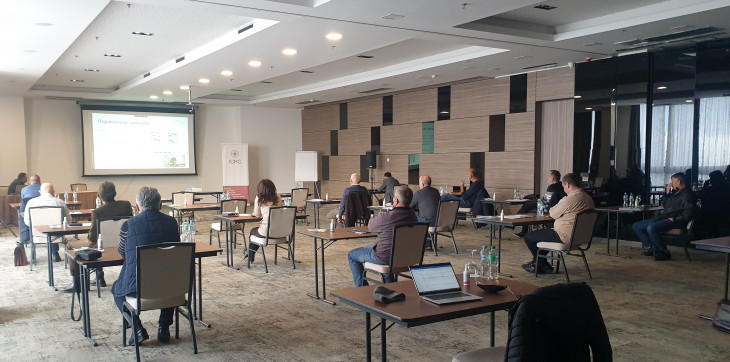
Training for the MPI investigators on analytical methods and techniques, Sarajevo, December 2020
In addition to boosting skills of the MPI staff and taking care about their mental well-being, the ICRC also aims to improve MPI's technical capacities and thus facilitate their search for the missing. In 2020, the ICRC donated 27 GPS devices and 18 laptops with accompanying equipment to the MPI to create additional preconditions for accelerating the process of searching for more than 7,000 persons still missing from the 1992-1995 conflict.
One of the main pillars within the ICRC's five-year strategy for missing persons and their families is boosting local forensic capacities. Due to travel and gathering restrictions caused by the COVID-19 pandemic, the initially planned participation of local forensic practitioners to international training and scientific conferences had to be cancelled.
However, the ICRC remained in regular touch with relevant forensic institutions and continued supporting them under the newly emerged COVID-19 conditions by distributing protective items and providing guidance for managing the dead bodies in consequence of the pandemic.
In the end of 2020, the Forensic Institute of the Medical Faculty at the Sarajevo University was refurbished and fully equipped with ICRC's support. Earlier, administrative preconditions and obstacles were solved together with the Faculty and University to make the Institute fully functional.
The new autopsy room, funded by the ICRC, will not only contribute to forensic activities related to missing persons, but also enable autopsies of people deceased from the pandemic, which was not possible earlier due to lack of a proper technical equipment.
In addition, the ICRC fully refurbished mortuaries in Banja Luka and Visoko, ensuring that the conditions for storing hundreds unidentified human remains there meet international standards.

